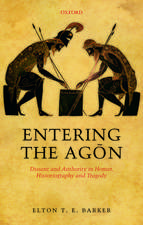History, Memory, and State-Sponsored Violence: Time and Justice: Routledge Approaches to History
Autor Berber Bevernageen Limba Engleză Paperback – 14 feb 2013
By embedding a profound philosophical reflection on the themes of historical time and historical discourse in a concrete series of case studies, this project transcends the traditional divide between ‘empirical’ historiography on the one hand and the so called ‘theoretical’ approaches to history on the other. It also breaks with the conventional ‘analytical’ philosophy of history that has been dominant during the last decades, raising a series of long-neglected ‘big questions’ about the historical condition – questions about historical time, the unity of history, and the ontological status of present and past –programmatically pleading for a new historical ethics.
| Toate formatele și edițiile | Preț | Express |
|---|---|---|
| Paperback (1) | 389.70 lei 6-8 săpt. | |
| Taylor & Francis – 14 feb 2013 | 389.70 lei 6-8 săpt. | |
| Hardback (1) | 1115.69 lei 6-8 săpt. | |
| Taylor & Francis – 5 aug 2011 | 1115.69 lei 6-8 săpt. |
Din seria Routledge Approaches to History
-
 Preț: 342.06 lei
Preț: 342.06 lei - 8%
 Preț: 389.46 lei
Preț: 389.46 lei -
 Preț: 326.84 lei
Preț: 326.84 lei -
 Preț: 311.28 lei
Preț: 311.28 lei -
 Preț: 311.41 lei
Preț: 311.41 lei -
 Preț: 309.75 lei
Preț: 309.75 lei -
 Preț: 310.96 lei
Preț: 310.96 lei -
 Preț: 353.96 lei
Preț: 353.96 lei - 9%
 Preț: 1003.81 lei
Preț: 1003.81 lei -
 Preț: 311.41 lei
Preț: 311.41 lei -
 Preț: 309.38 lei
Preț: 309.38 lei - 9%
 Preț: 934.90 lei
Preț: 934.90 lei -
 Preț: 388.26 lei
Preț: 388.26 lei -
 Preț: 389.38 lei
Preț: 389.38 lei -
 Preț: 390.37 lei
Preț: 390.37 lei -
 Preț: 418.13 lei
Preț: 418.13 lei -
 Preț: 436.14 lei
Preț: 436.14 lei -
 Preț: 418.56 lei
Preț: 418.56 lei -
 Preț: 396.29 lei
Preț: 396.29 lei - 18%
 Preț: 1109.18 lei
Preț: 1109.18 lei - 26%
 Preț: 764.20 lei
Preț: 764.20 lei - 18%
 Preț: 1060.56 lei
Preț: 1060.56 lei - 30%
 Preț: 848.55 lei
Preț: 848.55 lei - 17%
 Preț: 257.90 lei
Preț: 257.90 lei -
 Preț: 416.22 lei
Preț: 416.22 lei -
 Preț: 389.66 lei
Preț: 389.66 lei - 18%
 Preț: 1000.27 lei
Preț: 1000.27 lei - 18%
 Preț: 1000.27 lei
Preț: 1000.27 lei - 18%
 Preț: 1109.18 lei
Preț: 1109.18 lei - 26%
 Preț: 652.84 lei
Preț: 652.84 lei - 18%
 Preț: 1000.27 lei
Preț: 1000.27 lei - 18%
 Preț: 1056.28 lei
Preț: 1056.28 lei -
 Preț: 389.22 lei
Preț: 389.22 lei - 18%
 Preț: 1000.27 lei
Preț: 1000.27 lei -
 Preț: 416.22 lei
Preț: 416.22 lei - 18%
 Preț: 700.75 lei
Preț: 700.75 lei
Preț: 389.70 lei
Nou
Puncte Express: 585
Preț estimativ în valută:
74.57€ • 78.08$ • 61.85£
74.57€ • 78.08$ • 61.85£
Carte tipărită la comandă
Livrare economică 09-23 aprilie
Preluare comenzi: 021 569.72.76
Specificații
ISBN-13: 9780415822985
ISBN-10: 041582298X
Pagini: 262
Dimensiuni: 152 x 229 x 18 mm
Greutate: 0.46 kg
Ediția:New.
Editura: Taylor & Francis
Colecția Routledge
Seria Routledge Approaches to History
Locul publicării:Oxford, United Kingdom
ISBN-10: 041582298X
Pagini: 262
Dimensiuni: 152 x 229 x 18 mm
Greutate: 0.46 kg
Ediția:New.
Editura: Taylor & Francis
Colecția Routledge
Seria Routledge Approaches to History
Locul publicării:Oxford, United Kingdom
Public țintă
Postgraduate and UndergraduateCuprins
1. Introduction Part I 2. ‘La Muerte No Existe.’ The Madres de Plaza de Mayo and the Resistance against the Irreversible Time of History 3. ‘We the Victims and Survivors Declare the Past to Be in the Present.’ The ‘New South Africa’ and the Legacy of Apartheid 4. ‘The Past Must Remain the Past.’ Time of History and Time of Justice in the ‘New Sierra Leone’ Part II 5. A Hard Time Thinking the Irrevocable. Why It Is So Difficult to Understand the Haunting Past 6. Searching for Other Times. Some Critiques of the Absent and Distant Past 7. Spectral times. Jacques Derrida and the Deconstruction of Time 8. History and the Work of Mourning Conclusion
Recenzii
"In the end, Bevernage accomplishes nothing less than a completely new understanding of the referential illusion of historical discourse … As with many truly original works of criticism, Bevernage’s arguments seem so perfectly obvious in hindsight … Reading History, Memory, and State-Sponsored Violence is a humbling experience." Wulf Kansteiners, SUNY Binghamton
"This book is already destined to become a classic." Chris Lorenz, Free University of Amsterdam
"This book is already destined to become a classic." Chris Lorenz, Free University of Amsterdam
Descriere
This book is centered around the thesis that the way one deals with historical injustice and the ethics of history is strongly dependent on the way one conceives of historical time; that the concept of time traditionally used by historians is structurally more compatible with the perpetrators’ than the victims’ point of view.














